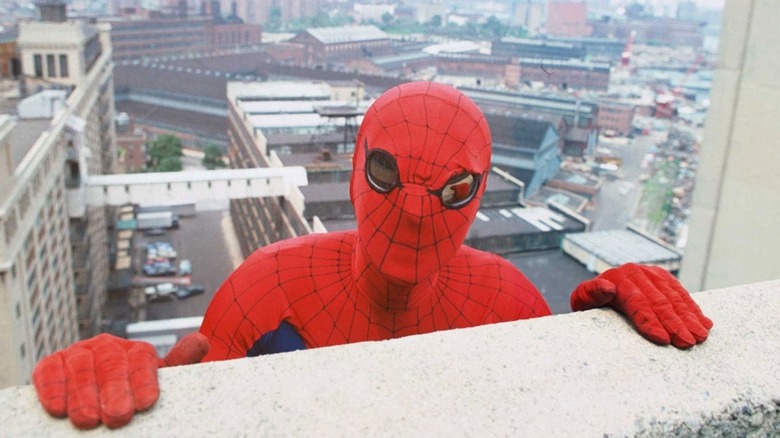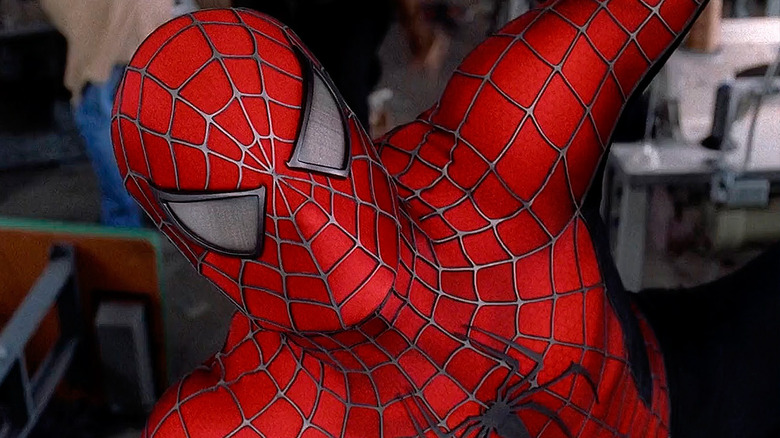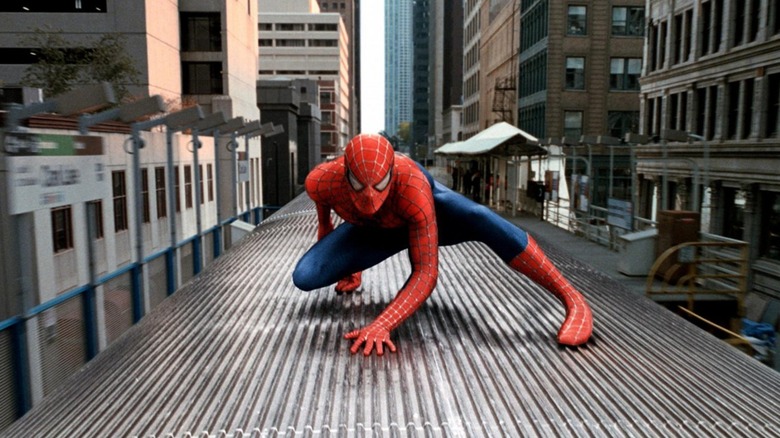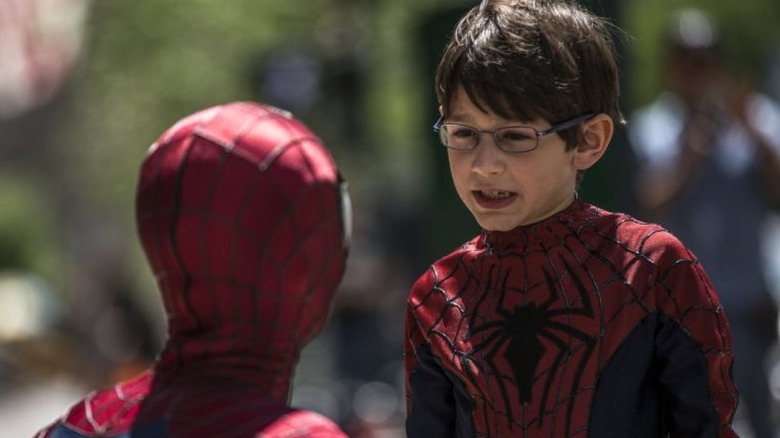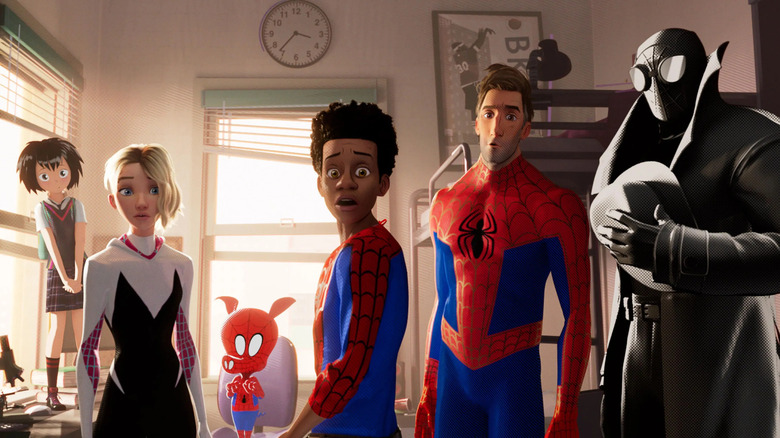What Is The Best Spider-Man Movie? An Investigation
To date, there have been 14 Spider-Man feature films, with a 15th — "Spider-Man: Beyond the Spider-Verse" — currently in production. The newest film, "Spider-Man: Across the Spider-Verse," has already been garnering a great deal of acclaim, with some critics calling it one of the best superhero movies ever made. Meanwhile, Spider-Man has also headlined some of the silliest superhero blockbusters of recent memory, as well as some justly maligned movies that, curiously, garnered affection over time. Also, despite how well-loved the character may be, Spider-Man was also the subject of at least three made-for-TV movies that modern Spider-Fans haven't much bothered to track down. When looking at the character's entire cinematic body of work, Spider-Man is great and terrible, popular and obscure, amazing and forgettable all at once.
Ah, but what is the best "Spider-Man?" That answer is clearly going to be subjective and will depend on an individual's attachment to their favorite version of the character. Some fans may be sticklers for canon and will prefer a Spider-Man whose story adheres closely to the story written by Stan Lee in comic books from 1963. Others may prefer a modern, up-to-date version of Spider-Man that deliberately bucks established canon. The story of "Across the Spider-Verse" openly eschews canon, which may be why many critics are responding the way they are.
As such, a declaration of the best "Spider-Man" film will be the opinion of this author and is certainly up for a good-natured debate.
That said, the best Spider-Man movie — without question, and even taking "Across the Spider-Verse" into consideration — is Sam Raimi's "Spider-Man 2" from 2004.
It's Spider-Man 2
One might argue that the two most important aspects of Spider-Man as a character are his guilt and his exhaustion. Spider-Man didn't become a superhero because he was infused with a sense of righteousness, but because he learned — in the hardest way imaginable — that complacency leads to death. If Spider-Man isn't using his superpowers to change the world for the better, then he is failing on an ethical level. With great power, comes, etc. This is a wonderful moral philosophy to take from Spider-Man. If one is capable of doing good things, then one must.
Of course, despite wanting to adhere to a life of righteousness, Spider-Man has other, begrudging practical considerations in his life. Spider-Man has to pay rent, for instance. Hence, he needs to work a job. He wants to continue to go to school, have friends, and be part of the human world. Being Spider-Man is an ethical obligation, but it takes up so much time and energy, Peter Parker finds himself constantly scrambling to keep his head above water. Spider-Man is a superhero who is cool and flip, yet overworked and tired and struggling to maintain the relationships in his life. Nothing is easy for Spider-Man. For anyone in the workforce, this is utterly relatable.
These aspects of Spider-Man are never clearer than in "Spider-Man 2," a film that sees Peter Parker (Tobey Maguire) getting fired from his job as a pizza delivery man, unable to make a connection with his would-be girlfriend Mary-Jane (Kirsten Dunst), and constantly yelled at by his bosses, professors, and landlord. When he washes his Spider-Man costume at the local laundromat, the colors run and stain his other clothes. Life isn't easy for Spider-Man.
Why it's Spider-Man 2
This bogged-down, bedraggled version of Spider-Man is ineffably appealing. While one might like to imagine the thrill one might experience in being a superhero, it's also worth pondering that it would also suck a lot. Being a Spider-Man is like having a really cool internship. It may be fun at the moment, but it doesn't pay. "Spider-Man 2" is about that.
The only recognition Spider-Man gets for his heroism is abstract. The citizens of New York respect the service he provides and are willing to defend him from a villain despite the bloviating of the local tabloids. Is Spider-Man a menace? Not to Joey "Coco" Diaz. Spider-Man nearly kills himself to singlehanded stop a speeding train, and New Yorkers help him out and keep his secret in exchange. He is a member of the community, even if he has no social life or personal success. Sad sack Spider-Man is the best Spider-Man.
"Spider-Man 2" also balances that humanity with a sense of whimsy. There is something light and comic book-y about "Spider-Man 2" that Raimi wasn't able to nail in his disappointing 2002 original. The 2002 "Spider-Man" only nailed the humanity of Spider-Man in fits, and the cartoonish special effects robbed the character of his gravity, literally and figuratively. "Spider-Man 2" found just the right balance between the real and the unreal. When Dr. Octavius (Alfred Molina) points to a device on his spine, declaring it to be the one widget that will prevent him from becoming a supervillain, audiences chuckle knowingly, assured it will be destroyed within the next 120 seconds.
That one scene in The Amazing Spider-Man 2
However, the best moment in any Spider-Man movie comes not from a Sam Raimi film, but from "The Amazing Spider-Man 2." In that film, Spider-Man (Andrew Garfield) sees a young boy being bullied by other children. The bullies knock the boy's science project out of his hands, breaking it. Spider-Man, eager to stand up to the bullies, chases them off. But, knowing that merely frightening bullies isn't the same thing as heroism, Spider-Man stays behind to talk to the boy. Peter looks at the boy's science project and compliments him that he did a good job. He uses his webbing to fix the project and then offers to walk the boy home. They stroll together, talking lightly. This may be the most heroic moment in any modern superhero movie. "The Amazing Spider-Man 2" is an absurd and overstuffed film otherwise, but does offer this awesome moment of peace.
Sadly, because Spider-Man has been such a large part of the popular consciousness for so long, merely keeping him at street level is difficult to maintain. His villains are outlandish and powerful, and the character ended up tooling around with space aliens and wizards and the like, eventually fleeing into other dimensions to meet alternate versions of himself. As such, there are dozens — maybe hundreds — of Spider-Men and -Women in the world. Which version is "correct?" This question is only muddied by the fact that 20 years of Spider-Man movies have seen multiple timelines and iterations introduced, including a world where Venom exists. These things are not easy to parse out from an outsider's eye.
Into the Spider-Verse is a close second
The astonishing "Spider-Man: Into the Spider-Verse" addresses that directly. Miles Morales (Shameik Moore) is Spider-Man but finds that he has peers from other dimensions who have all suffered similar tragedies. From their hurt, Miles learns to be righteous and heroic, using his spider powers for good. Miles also sees through a family member that villainy is always a temptation for some people, and leading by example is ultimately better than guilt or tragedy. "Into the Spider-Verse" argues that there is no "correct" version of Spider-Man, but that anyone with a drive for righteousness, whether based on guilt or not, can be heroic. That notion alone makes it one of the better Spider-Movies to date. It's certainly a close second. Its maximalist sequel may ultimately prove to be just as great, but its truncated, cliffhanger ending leaves a lot of its themes dangling. Whether or not it emerges as better than "Into the Spider-Verse" will have to wait until March of 2024.
The remaining films have been mixed bags. Raimi's "Spider-Man 3" is overblown and reeks of studio tinkering. Marc Webb's two "Amazing Spider-Man" movies are stylish but clunky and written in a predictable, pat manner. The three "Spider-Man" films set in the Marvel Cinematic Universe somehow manage to give Peter Parker (Tom Holland) no personality whatsoever as he vies not to be heroic but to join a superhero football team. Only "No Way Home" manages to be about something righteous: Spider-Man would rather rehabilitate the villains than execute them. The 1970s TV movies are fun for their budget, but their cheapness gets in the way of their storytelling.
Two or three great films out of 14 isn't a great track record, but we can at least be grateful for those two or three.
